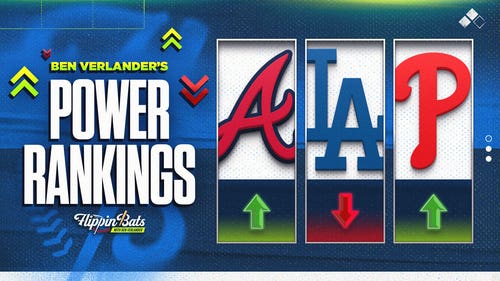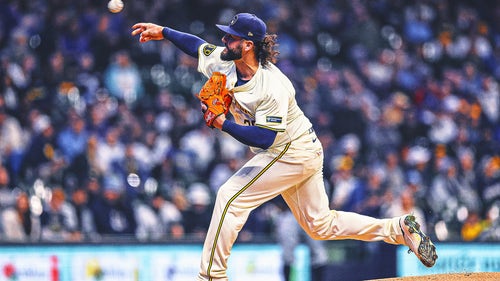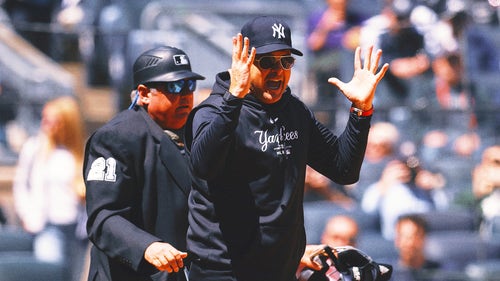
Philadelphia Phillies' collapse of 1964 still stings 50 years later

On July 1, the Milwaukee Brewers were atop the NL Central with a 6½-game lead.
After Tuesday's loss at Cincinnati, Milwaukee is one loss or one San Francisco win away from being eliminated from playoff contention. The Brewers and Giants each have five games left.
Back in July, this wasn't the way the Brewers pictured their season wrapping up. They fell out of first on Sept. 1 and dropped seven of their next eight. From Aug. 26 to Sept. 9, Milwaukee lost 13 of 14.
With that magic number of one for elimination, the Brewers' postseason dreams aren't officially over, but the odds don't look good.
The freefall is a total bummer for Milwaukee, but it doesn't compare to what the 1964 Philadelphia Phillies went through.
Fifty years ago this week, those Phillies found themselves in the midst of one of the most incomprehensible slides in the history of the game — a 10-game “Phold,” as it became known. The slide cost them the NL pennant and gave hope to fans of teams with slim chances for decades to come.
With 12 games left in the '64 regular season, the Phillies held a 6½-game lead in the National League. In those days, the math was a bit easier to figure out and the stakes were considerably higher. With no playoffs to speak of other than the World Series, it was a simple case of win-and-you're-in.
“I think everybody in Philadelphia thought we were going to win the pennant,” Dallas Green, a relief pitcher on the 1964 team, told FOX Sports in a phone interview last week. “I think everybody in the clubhouse thought we were going to win it. I didn’t think there were many doubts at all.”
Except, for those Phillies, nothing over those final 12 games was simple.
**********
That sentiment expressed by Green was shared in the clubhouse of the teams trailing Philadelphia in 1964, as well. The opinion that the NL title had already been decided wasn’t a matter of demurral by those giving chase so much as it was one of basic arithmetic.
The St. Louis Cardinals were initially 11 games out in the NL with 39 games left to play, and even after an early September rally in the wake of the infamous Lou Brock-for-Ernie Broglio trade, St. Louis still found itself 6½ games out after a loss to the Cincinnati Reds on Sept. 20. That defeat dropped the Cardinals into a tie with the Reds, who had been a season-high 8½ games out five days earlier and were still adjusting after an August managerial change.
So while the Cards and Reds hadn’t completely ruled out a miracle, they knew that a lot of help — likely too much of it — would be required in order to steal the pennant from Philly, which had been atop the league since July 16.
“I don’t think anybody on the team thought we were overwhelming favorites to overtake the Phillies,” Tim McCarver, catcher for the ‘64 Cardinals, told FOX Sports last week. “We’re smart people, that was a very smart team, and you didn’t have to be smart to figure that out.”

Chico Ruiz, pictured as an Angel in 1970, stole home with Frank Robinson at the plate in 1964 stretch run.
Added then-Reds slugger Frank Robinson in a phone interview Monday: “We didn’t even think we were in a pennant race.”
Over the next week and a half, however, the Phillies would go into a complete freefall, losing 10 consecutive games in seemingly every manner possible. With each loss, the impossible dream became more and more attainable for the Cardinals and Reds, and perhaps no single Phillies loss during that slide was more unlikely than the one that started the collapse.
The date was Sept. 21, and the situation was a 0-0 ballgame between the Reds and Phillies at Connie Mack Stadium in Philadelphia. Through five innings, Phils starter Art Mahaffey had allowed three hits and struck out five, and after coaxing a Pete Rose groundout to start the sixth, Mahaffey allowed a single to right by Chico Ruiz.
The next batter, Vada Pinson, advanced Ruiz to third on a single, but was thrown out trying to stretch it to a double, leaving the slugging Robinson at the plate with two outs and Ruiz on third. Soon, Mahaffey had the future Triple Crown-winner Robinson in a two-strike count, and as he motioned to the plate to try to end the Cincinnati threat, Ruiz inexplicably broke for home.
“I was dumbfounded, really,” Robinson told FOX Sports. “He (Ruiz) caught me off guard like he caught everybody else off guard, and I had no choice but to back out of the box a little bit and give him room enough to try to score. I was really taken aback by Chico trying to steal home in that situation.”
Thankfully for Cincinnati, the only person more surprised than Robinson may have been Mahaffey, whose pitch sailed out of the reach of Phillies catcher Clay Dalrymple, allowing Ruiz — who would forever become known in Philadelphia as “Chico F---ing Ruiz” — to score (and perhaps keep his head securely attached to his neck).
“Chico Ruiz stole home with two outs and two strikes on Frank Robinson,” Mahaffey would later recall to The Associated Press in 1993. “Now you must realize that with two outs and two strikes, if you throw a strike, Frank Robinson swings and knocks Chico Ruiz’s head off. It was just so stupid.”
Stupid or not, the play worked, and the Reds would go on to win 1-0. It’s impossible to say with certainty whether Ruiz’s steal perpetuated the Phillies’ collapse that would follow — it may just as easily have been Willie Davis’ game-winning steal of home in the 16th inning of a loss to the Dodgers two days earlier — but for those who believe in curses, the next nine days would seem to support the claim that it played a part.
“It shook us to the core,” Green said of the aftermath of the play. “It shouldn’t have been the case; it was just another loss that we should have overcome. But we weren’t able to get ourselves righted after that.”
**********
To be clear, it wasn’t just the Chico Ruiz game that did the Phillies in that season.
There was also the game on Sept. 23 where Pinson went yard twice and the light-hitting Ruiz hit one of his two homers on the year to help Cincinnati to a 6-4 win. Or the game two days later when Dick Allen hit an inside-the-park homer to tie the Milwaukee Braves in the bottom of the 10th, only to have Philly lose the game later thanks in part to a 12th-inning throwing error by Dalrymple.
The next day, Sept. 26, looked like it would end with the Phillies back on track, as they took a 4-3 lead into the final inning. But Bobby Shantz allowed two singles to start the bottom of the ninth before an error loaded the bases with no outs. Rico Carty then hit a bases-clearing triple to give the Braves a 6-4 lead that would hold in the bottom of the frame, a situation that had become all too familiar to those in the Philadelphia clubhouse.
“We had only two guys (with late-game experience) — Ed Roebuck and our main guy Jack Baldschun — and for some reason, (manager) Gene (Mauch) got upset with Jack in one of his losses, and wouldn’t pitch him at the end of the game anymore,” Green said. “We ended up trying to close games, tight games particularly, with guys like myself and other guys that really didn’t have the ability or the experience to close games, and I think we lost a lot of games in the late innings because of it.”
After the loss on Sept. 26, Philadelphia’s lead stood at a half-game, thanks also to 10 wins in 11 games by the surging Reds. On Sept. 27, the Phillies would lose again — their seventh straight, as Green allowed five earned runs in 1 2/3 innings in relief of Jim Bunning, who had allowed seven runs in three innings — as the Reds took both games of a doubleheader from the Mets and the Cardinals finished off a five-game sweep of the Pirates.
Before play began on the 28th, it was suddenly and improbably the Reds — at that point winners of 12 of 13 — who held a one-game lead in the NL, with Philadelphia one game back and St. Louis another half-game behind the Phillies.
“We just felt like we were very fortunate,” Robinson said when asked to explain the team’s hot streak. “All of a sudden we looked up and we were in a pennant race and had a good chance to win it. That really picked us up as a team and an organization, and really gave us new life. We knew we had a real good chance to wind up in the World Series.”
But like everything else in the wacky '64 NL pennant race, things were far from over.
**********
Coming into the final Monday of the regular season, the Cardinals were as hot as anyone in baseball, having taken five games in four days in Pittsburgh to pull within 1½ games of the Reds. Like Cincinnati, St. Louis unexpectedly found itself not just in the thick of the pennant race, but with a legitimate shot at winning it.
“You can’t explain momentum,” McCarver said of the Cardinals’ surge. “If anybody could explain it, you’d have a lot of owners investing an awful lot of money in it. But you can’t. I could sit here and come up with a fancy story about what happened and, ‘Oh yeah, we had a leap of faith because of this, because of that,’ but we were still taking it one game at a time, and we still understood the consequences of even one loss that (final) week, particularly to the Phillies.”
Still, with a three-game home set about to start against the reeling Phillies followed by three more at home to close the season against the woeful Mets, the Cards knew their chances of making up more ground were good, if not great.
“Ballplayers are animalistic when they can smell the blood, and on the contrary, when you’re leaking blood, you understand that the prowl is underway,” McCarver said. “Those are the laws of the nature, and those, really, are the laws of baseball. When you can smell the blood, you do things that you wouldn’t ordinarily do. You’re better than you think you are. And when you’re losing like that, you’re worse than you really are.”
The Cardinals swept the wounded Phillies, thanks in large part to outstanding pitching from starters Bob Gibson, Ray Sadecki and Curt Simmons.
And because of an untimely flop by the Reds, who dropped two of three to visiting Pittsburgh to start the week — including one on a squeeze play in the 16th inning of a 1-0 loss — it was suddenly St. Louis that had a half-game lead in the NL with three games to play, while Cincinnati and Philadelphia only had a two-game set against each other remaining.
“We felt good, but we didn’t think, ‘Oh we’re playing the lowly Mets,’” McCarver said of the atmosphere heading into the final series of the regular season. “Ballplayers don’t think that way.”
Meanwhile, the Phillies, losers of 10 straight and 12 of 13 were about ready to call it a season. A three-way tie atop the NL was still technically possible, but only if Philadelphia rebounded to win both of its games against Cincinnati and St. Louis was swept by the worst team in the league.
At that point, the team felt, beef on weck had a better chance of replacing the cheesesteak as Philadelphia’s signature sandwich than the Phillies had of reaching the World Series.
“I still think we all thought we were going to win (our games), but I think the thought (of winning the pennant) was fleeting and fleeting fast,” Green said. “There was almost a sense of inevitability in the clubhouse, you might say.”
**********
As soon as the Phillies began to lose hope, however, the race sucked them back in.
It started in St. Louis, where the Cardinals lost a 1-0 decision to the Mets as New York starter Al Jackson outdueled Gibson with a complete-game, five-hit shutout. Meanwhile, in Cincinnati, Philadelphia eked out a win that no one could have seen coming to keep its hopes alive.
Robinson got the Reds on the board early, knocking in Rose with a first-inning double. Then in the sixth inning, with Robinson at the plate and runners on first and second, Cincinnati called for a double steal that would end with both runners scoring on the play thanks to a pair of Phillies errors.
With a 3-0 lead against a staggering Phillies team and with pitcher Jim O’Toole throwing a gem for Cincinnati, it seemed that Philadelphia was on the precipice of elimination. Even a fourth-inning triple play by the Philly defense couldn’t spark the bats. But in the bottom of the seventh inning, Phillies pitcher Chris Short hit Reds shortstop Leo Cardenas with a pitch that changed everything.
The pitch drilled Cardenas in the back, and inexplicably, Cardenas responded by attempting to charge the mound, bat in hand. The brawl ultimately didn’t amount to much, as Dalrymple got between Cardenas and his pitcher before things could get out of hand, but the scene fired up the despondent Philadelphia dugout.
In the top of the eighth inning, Cardenas once again cost his team, misplaying a Frank Thomas pop-up that fell between him and second baseman Rose. After a walk and a single made it 3-1, O’Toole was replaced by Reds reliever Billy McCool, who struck out his first batter before allowing a game-tying triple to Allen and a single to Alex Johnson that gave Philadelphia a 4-3 lead, the eventual final score.
“We were so upset with what had happened in the (seventh) inning with (Cardenas) trying to charge the mound and firing up the Phillies,” Robinson said. “I think we just wanted to get all over him, and I think that’s what cost us. The Phillies were dead. They were dead, and that brought them to life.”
After the game, tempers flared in the Reds clubhouse, as well, with O’Toole confronting Cardenas about his role in the loss. Cardenas responded by grabbing and threatening O’Toole with an ice pick, Robinson said. His Cincinnati teammates stepped in before things got ugly — the second time that afternoon Cardenas had to be stopped from attacking someone after brandishing a weapon — but the impact on the team’s psyche couldn’t be reversed.
The Mets beat St. Louis again on Saturday, an off day in the Cincinnati-Philadelphia series, but Robinson knew it was over.
“I think that was the one,” he said of the Oct. 2 loss, “that really took the life out of us.”
**********
On the morning of Oct. 4, 1964, the final day of the regular season, both the Cardinals and Reds took to their respective home fields with identical 92-69 records. The Phillies were one game back at 91-70.
For each of the three teams, the goal was clear, but without complete control over its destiny:
St. Louis needed to win and have Cincinnati lose to finish in sole possession of the NL pennant; Cincinnati needed to beat Philadelphia and have St. Louis lose a third straight to the Mets to accomplish the same; the Phillies needed to beat the Reds and have the Cardinals lose to force the first three-way tie in baseball history.

Jim Bunning was called on to make four starts in nine days.
Had the Reds and Cardinals won and remained knotted up, the NL champion would have been decided in a three-game tiebreaker series that no one wanted to play. (At the time, the AL settled such disputes with a one-game tiebreaker.) Had all three NL contenders finished with the same record a complicated round-robin tournament would have been used to decide the league champion.
For the Cardinals, the ball was in the hands of Simmons, who had a favorable matchup against Mets starter Galen Cisco, who was 6-18 on the year coming in. St. Louis had expected to face Tracy Stallard, who had pitched well in two of three starts against the Cardinals that year, despite losing 20 games overall that season, but Stallard was held out — the reason, the Cardinals players heard, was a broken wrist suffered in an incident in a bar.
“You can’t control the three-way tie other than losing that game, yourself, so our emphasis was on trying to win the game,” McCarver said of the Cardinals’ mindset going in.
Roughly 350 miles to the east in Cincinnati, the Reds trotted John Tsitouris out to the mound to face Bunning, the Phillies ace. Bunning was making his fourth start in nine games, as Mauch had gone to a short rotation during the 10-game losing streak, and each of the previous two starts had been disasters.
Tsitouris, on the other hand was rested, but by no means the Reds’ best pitcher, and many — including some of the Cincinnati players — felt that Jim Maloney, who had thrown 11 shutout innings in his previous start against Pittsburgh four days earlier, should have been on the rubber instead.
“We went into that ballgame in a downer because we felt like the right guy should have been on the mound, but he didn’t have his normal rest,” Robinson said. “When you’re fighting for your life, you’ve got to go with your best as long as he can go, and stay out there as long as he could. But we didn’t send our best to the mound and the air was taken out of us.”
Sure enough, the Phillies jumped on Tsitouris early, scoring three runs in 2 1/3 innings. In the fifth inning, McCool gave up a solo homer to Allen to push the lead to 4-0. In the sixth, the Phillies added five more runs, the dagger coming on Allen’s second homer, a three-run job off of Joey Jay.
Philadelphia would add one more run in the seventh, and with a 10-0 victory in hand, attentions turned to St. Louis, where both the Reds and Phillies were suddenly pulling for the Mets.
“We were in the bullpen listening to the game, and the Mets had a lead and we were getting pretty excited,” Green recalled. “But they finally caved in.”
New York grabbed a 3-2 lead in the top of the fifth inning, giving Cincinnati and Philadelphia hope, but the edge was short-lived. St. Louis scored three in the fifth, followed by three more in the sixth, and Gibson pitched four solid innings in relief on just one day’s rest as the Cardinals held on for an 11-5 win that put them in the World Series.
“It was delirious,” McCarver said of the celebration afterward. “We were certainly surprised that we were in that situation. I don’t think anybody, to a man, could say, ‘We knew we’d be here.’”
Back in Cincinnati, both the Reds and Phillies had to cope with their respective seasons coming to an end after each felt they could have and should have been the ones celebrating a pennant.
“To a man, we were beat, there’s no question about that, and pretty downhearted,” Green said. “I think we just felt that it was meant to be. ... It really hurt, and it has hurt for a lot of years.”
Added Robinson: “It was devastating. We were down. You don’t come that close every year. The opportunity was there and we didn’t take advantage of it, and St. Louis came in the back door. They earned it, we didn’t, and it was a long winter. ... It took the wind out of us. Nobody was doing anything to cause headlines or anything like that. No one was threatening to jump of a bridge or cut their wrists, but it’s just that we knew and we felt that we let one get away when it was right there for us.”
**********
Once the chaos of the NL race was behind them, the Cardinals would go on to win the 1964 World Series over the New York Yankees in seven games, with Gibson, who tossed complete game wins in Games 5 and 7, earning MVP honors.
Hard as it is to believe, even the St. Louis players say they felt sorry for the teams they’d overtaken on their epic run to the pennant, once they had a moment to reflect.
“Once you’re through with something that is historic in your business — and that was certainly an historic two-week drive — you look back on it and there’s a feeling of empathy,” McCarver said. “Not sympathy, but empathy for the teams that coughed it up. Because there were a lot of games played over a lot of years and you do have feeling for the other side. ...
“There is a delicateness, I think, in the competition. Obviously, you’re glad you were the victor and glad you were the team that got hot at the right time. But it was a remarkably historic year that could have turned out much, much differently. ... Everybody says, ‘Well, the season is too long,’ and all that, but that season was just the right length for us. Had it been a 161- or 163-game season, who would have known?”
As for the losers, they had to find a way to learn a lesson from their respective collapses under pressure.
Green would never win a World Series as a player, but he managed the Phillies to a title in 1980 and says he applied a lot of the knowledge he acquired in 1964 to that run. Green says that late in the ‘64 season, his own manager, Mauch, got away from what worked all year, a mistake he vowed never to make in his years coaching a team.
“What I preached in my baseball time came as a result of 1964,” Green said. “The brass ring doesn’t come along very often, and you’ve got to grab it when you have a chance, but we didn’t grab it.
“I think the biggest lesson, really, is that you can’t count on next year all the time, and when that opportunity comes along to win a championship as a team, as an organization, you have to do everything you possibly can to accomplish that. I was a pusher all along, and I think Gene forgot to push the last 12 games, and I think a lot of us remember that, as much as anything.
“... Gene the whole year had really demanded that we play the game right and that we do things right, and toward the end, I don’t think we got very much direction at all. All during the season, he had ranted and raved every time we did something wrong or every time we got into a gulley and couldn’t get ourselves out. He would be a screamer and a yeller and he threw things around the clubhouse. That was his way, I guess, of waking us up and keeping us going. But during that stretch when we lost all those games, he kind of became a recluse. He didn’t say much and he didn’t do any ranting and raving. He just let us play and whatever happened happened.”
Robinson wouldn’t have to wait as long for a title of his own, winning championships in 1966 and 1970 with the Baltimore Orioles. In ‘66, the Orioles’ lead in the AL reached a season-high 13½ games in late July, and unlike the Phillies in ‘64, Baltimore never collapsed, clinching the AL pennant with eight games left in the regular season.
“We put it away real early,” the Hall of Famer Robinson said. “We put it away early because we played good hard baseball and kept at it until we had it clinched. We wanted to win more than 100 ballgames and that team stayed on the prowl and didn’t let up. I think we let up in Cincinnati in 1964.
“... We controlled our own destiny (in '64 with the Reds) and we were playing two teams that were not at the top of their games, and it just didn’t work out for us, and we just felt like we didn’t do what we should have done as far as executing the fundamentals on the field and doing the things on the field that we should have done to help us win. It hurt and it stayed with us for a long time.
“That one was one that got away, and one that will always stay with me, as far as I’m concerned.”
You can follow Sam Gardner on Twitter or email him at samgardnerfox@gmail.com.











































































































































